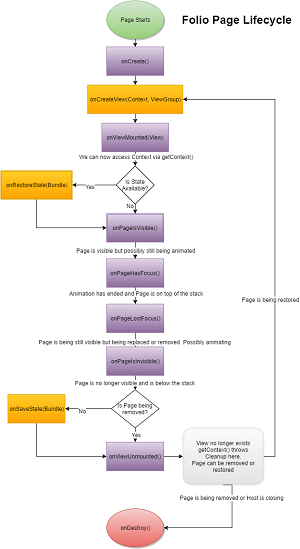Folio
Folio is a Page based navigation framework for Android with a simplified lifecycle and easy transition animations. It's intended to fulfil a similar role to fragments while looking more like Activities.
Users
Apps using Folio in production
Current Version: 1.0.0
Folio follows Semantic Versioning.
Installation
Gradle
Folio is available on jcenter.
compile 'com.umaplay.oss:folio:1.0.0'Manual Installation
Download the aar artifact from the artifacts directory and copy it into the libs directory of your app module.
Specify libs as a repository in your root gradle file.
allprojects {
repositories {
...
flatDir {
dirs 'libs'
}
}
}
Specify Fluxxan as dependency in your app's gradle file.
dependencies {
compile fileTree(dir: 'libs', include: ['*.jar'])
compile(name: 'folio-1.0.0', ext: 'aar')
...
}
Introduction
A Folio app is composed of simple Pages. If you are familiar with Activities, then you'll be right at home using Folio. The lifecycle is simple and similar to that of Activities.
Folio is composed of the
- Host
- PageManager
- Page
- PageFactory
How it works
Pages are hosted inside of an Activity, Fragment or even another Page. A PageManager handles the lifecycle of the pages and ensures everything remains consistent. The Host is responsible for notifying the PageManager of lifecycle changes and also, can respond to changes in the Stack.
Host
The Host can be an Activity, Fragment or even another Page. The Host must call the respective lifecycle methods on PageManager.
PageManager.onStart
PageManager.onResume
PageManager.onPause
PageManager.onStop
PageManager.onDestroy
PageManager.onSaveInstanceStateFolio provides a PagedActivity which handles the heavy lifting of notifying the PageManager of lifecycle changes, handling on Activity.onBackPressed and responding when the Stack is empty.
protected void onCreate(Bundle savedInstanceState) {
super.onCreate(savedInstanceState);
setContentView(R.layout.activity_main);
//create and set our manager which we can retrieve later using getPageManager()
setPageManager(new PageManager((ViewGroup) findViewById(R.id.container), this, App.getRefWatcher(), savedInstanceState));
//if instance state is null, then this is our first launch, let's navigate to the main page
//the page manager automatically restores the stack from the savedInstanceState
if (savedInstanceState == null) {
getPageManager().goTo(new RedPage.RedPageFactory());
}
}
PageManager
The PageManager manages all pages. A Host can have as many instances as is feasible and Each Page can have a NestedPageManager for free (the library handles it's lifecycle for you). Each manager requires a container which is simply a ViewGroup ( FrameLayout works great), a PageStackDelegate which is notified when the stack is empty and importantly, an instance of com.squareup.leakcanary.RefWatcher to help catch memory leaks. We enforce the use of the RefManager because a memory leak can bring the entire application to it's knees very quickly.
When navigating to a page, you can provide a PageAnimatorFactory which animates the addition and removal of Pages. By default, Pages are not animated. Folio includes AnimatorUtils which can help you create simple translation and fade animators. But you are free to create your own.
You can add StackChangedListeners to listen to changes in the stack and react accordingly. For example, to update an actionbar (if you choose to manage it in the host).
Page
A Page is a self contained "screen" in a Folio application with a simple lifecyle and state preservation. Pages are modelled after activities and therefore easy to use.
Lifecycle
The lifecycle is simple and easy to understand. It's been detailed in the diagram below. Click to view large size.
Context
You can get a context instance by calling getContext() between onViewMounted and onViewUnmounted. Doing so outside of this will throw an IllegalStateException.
NestedPageManager
A Page can get a cheap PageManager by calling getNestedPageManager(ViewGroup). The NestedPageManager is considered cheap because it is handled by the framework internally and you don't have to worry about the lifecycle or state handling.
This makes creating a Master/Detail view very easy to implement.
Caveat
Because the Page lifecycle is independent of the Host's, using the context for libraries that rely on the Lifecycle to clean up resources can lead to increased memory usage e.g. Glide. You wil need to find a way to bypass it. Refer to this gist for an implementation that supports Glide.
PageFactory
PageFactory handles the creation of Pages and storing of some information related to the Page. The provided BasePageFactory provide an implementation that handles all the heavy lifting.
Factory Guidelines
The PageFactory and PageAnimatorFactory must be serializable.
- Ensure that any properties are serializable.
- If nested, make sure it is a static class.
- Do not use an anonymous class
If the Factory cannot be serialized, the app will crash.
Contributing
Thank you for taking the time to contribute. But before you do, please read our contribution guidelines. They are simple, we promise.
Todo
- Writing Tests
License
MIT

